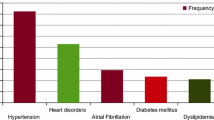Abstract
Considering that disrupted sleep may be detrimental to daytime performance in people with dementia, we set out to construct a questionnaire able to identify sleep patterns potentially associated with clinical and functional disease variables in this population. Two subsets of items indicative of patterns of unstable sleep and of disordered rapid eye movement sleep (REM) were selected. The first included items investigating sleep continuity, with low sleep continuity markers considered indicative of high arousability; the second included items investigating the frequency and quality of dreams and the frequency of clinically identifiable REM sleep behaviour disorder episodes. The questionnaire was administered to 140 outpatients with a diagnosis of mild-to-moderate Alzheimer’s disease. The Mini-Mental State Examination (MMSE), Activities of Daily Living (ADL), Instrumental Activities of Daily Living, Neuropsychiatric Inventory and Clinical Dementia Rating (CDR) were administered to quantify cognitive, functional and behavioural impairment. A subscale comprising items investigating sleep discontinuity/fragmentation and showing high internal consistency was constructed and found to correlate significantly with variables considered indexes of cognitive and functional deterioration in AD (MMSE, ADL and CDR). Conversely, it did not prove possible to obtain a subscale of dysfunctional REM phenomena. The use of a rapidly and easily administered sleep scale, like the one we constructed, appears to be suitable for early identification and longitudinal monitoring of sleep disturbances in AD.

Similar content being viewed by others
References
Vitiello MV, Borson S (2001) Sleep disturbances in patients with Alzheimer’s disease: epidemiology, pathophysiology and treatment. CNS Drugs 15:777–796
Bliwise DL (2004) Sleep disorders in Alzheimer’s disease and other dementia. Clin Cornerstone 6(Suppl 1A):16–28
Hatfield CF, Herbert J, van Someren EJ, Hodges JR, Hastings MH (2004) Disrupted daily activity/rest cycles in relation to daily cortisol rhythms of home-dwelling patients with early Alzheimer’s dementia. Brain 127:1061–1074
Harper DG, Volicer L, Stopa EG, McKee AC, Nitta M, Satin A (2005) Disturbance of endogenous circadian rhythm in aging and Alzheimer disease. Am J Geriatr Psychiatry 13:359–368
Vecchierini MF (2010) Sleep disturbances in Alzheimer’s disease and other dementias. Psychol Neuropsychiatr Vieil 8:15–23
Yesavage JA, Friedman L, Kraemer H, Tinklenberg JR, Salehi A, Noda A, Taylor JL, O’Hara R, Murphy G (2004) Sleep/wake disruption in Alzheimer’s disease: APOE status and longitudinal course. J Geriatr Psychiatry Neurol 17:20–24
Moran M, Lynch CA, Walsh C, Coen R, Lawlor BA (2005) Sleep disturbance in mild to moderate Alzheimer’s disease. Sleep Med 6:347–352
Backhaus J, Junghanns K, Born J, Hohaus K, Faasch F, Hohagen F (2006) Impaired declarative memory consolidation during sleep in patients with primary insomnia: influence of sleep architecture and nocturnal cortisol release. Biol Psychiatry 60:1324–1330
Killgore WD (2010) Effects of sleep deprivation on cognition. Prog Brain Res 185:105–129
Puetz J, Grohmann S, Metternich B, Kloepfer C, Feige B, Nissen C, Riemann D, Hüll M, Hornyak M (2011) Impaired memory consolidation during sleep in patients with functional memory disorder. Biol Psychol 86:31–38
Waters F, Bucks RS (2011) Neuropsychological effects of sleep loss: implication for neuropsychologists. J Int Neuropsychol Soc 4:1–16
Crowley K (2011) Sleep and sleep disorders in older adults. Neuropsychol Rev 21:41–53
Tractenberg RE, Singer CM, Cummings JF, Thai LJ (2003) The Sleep Disorders Inventory: an instrument for studies of sleep disturbance in persons with Alzheimer’s disease. J Sleep Res 12:331–337
Cummings JL, Mega M, Gray K, Rosenberg-Thompson S, Carusi DA, Gornbein J (1994) The Neuropsychiatric Inventory: comprehensive assessment of psychopathology in dementia. Neurology 44:2308–2314
Sinforiani E, Terzaghi M, Pasotti C, Zucchella C, Zambrelli E, Manni R (2007) Hallucinations and sleep-wake cycle in Alzheimer’s disease: a questionnaire-based study in 218 patients. Neurol Sci 28:96–99
Mckhann G, Drachman D, Folstein M, Katzman R, Price D, Stadla EM (1984) Clinical diagnosis of Alzheimer’s disease: report of the NINCDS-ADRDA Work Group under the auspices of Department of Health and Human Services Task Force on Alzheimer’s Disease. Neurology 34:939–944
Folstein M, Folstein SE, McHugh PR (1975) “Mini mental state”. A practical method for grading the cognitive status of patients for the clinician. J Psychiatr Res 12:189–198
Lawton MP, Brody EM (1969) Assessment of older people: self-maintaining and instrumental activities of daily living. Gerontologist 9:179–186
Lawton MP (1988) Scales to measure competence in everyday activities. Psychopharmacol Bull 24:609–614
Hughes CP, Berg L, Danziger WL, Coben LA, Martin RL (1982) A new clinical scale for the staging of dementia. Br J Psychiatry 140:566–572
Cattell RB (1966) The scree test for the number of factors. Mult Behav Res 1:245–276
Cronbach LJ (1951) Coefficient alpha and the internal structure of tests. Psychometrika 16:297–334
Nunnally JC (1978) Psychometric theory, 2nd edn. McGraw-Hill, New York
Carmines E, Zeller R (1979) Reliability and validity assessment. Sage Publications, Newbury Park
McDowell I, Newell C (1996) Measuring health: a guide to rating scales and questionnaires, 2nd edn. Oxford University Press, New York
Beaulieu-Bonneau S, Hudon C (2009) Sleep disturbances in older adults with mild cognitive impairment. Int Psychogeriatr 21:654–666
Naismith SL, Rogers L, Hickie IB, Mackenzi J, Norrie LM, Lewis SJ (2010) Sleep well, think well: sleep-wake disturbance in mild cognitive impairment. J Geriatr Psychiatry Neurol 23:123–130
Naismith SL, Lewis SJ, Rogers NL (2011) Sleep-wake changes and cognition in neurodegenerative disease. Prog Brain Res 190:21–52
Conflict of interest
The authors declare that they have no conflict of interest.
Author information
Authors and Affiliations
Corresponding author
Rights and permissions
About this article
Cite this article
Manni, R., Sinforiani, E., Zucchella, C. et al. A sleep continuity scale in Alzheimer’s disease: validation and relationship with cognitive and functional deterioration. Neurol Sci 34, 701–705 (2013). https://doi.org/10.1007/s10072-012-1118-6
Received:
Accepted:
Published:
Issue Date:
DOI: https://doi.org/10.1007/s10072-012-1118-6



